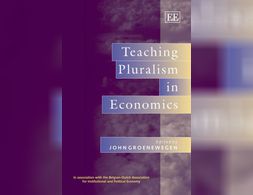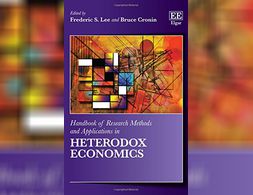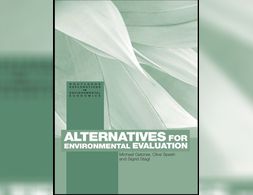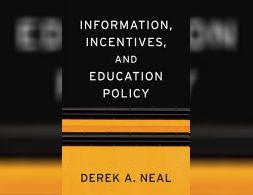✕
162 results
Neoclassical economics focuses on the allocation of scarce resources. Economic analysis is mainly concerned with determining the efficient allocation of resources in order to increase welfare.
The core idea of ecological economics is that human economic activity is bound by absolute limits. Interactions between the economy, society and the environment are analysed, while always keeping in mind the goal of a transition towards sustainability.
Along with addressing core conceptual issues in defining heterodox economics, we will cover in some detail five heterodox traditions in economics: Marxian Economics, Institutional Economics, Post-Keynesian Economics, Feminist Economics, and Ecologi-cal Economics. In the first class meeting, we discuss the structure and goals of the course, as well as the expectations and requirements from the students. In addition, we will discuss the concept of heterodoxy in economics, along with discussing the concepts and key issues in mainstream and neoclassical economics.
Beyond Neoclassical Economics is a remarkable new introduction to the main heterodox schools of economic thought which examines their main concepts and their critiques of mainstream theory.
This essay draws on several analyses on the gender impact of the recession and of austerity policies, in which authors acknowledge a threat to women’s labour market integration and a potential backlash to traditional gender labour structures. We contribute to that literature by asking whether recession and austerity convey a gender effect on educational attainment. Our aim in this essay is to portray the likely effects of austerity measures on gender equality with a focus on women’s participation in tertiary education and to hypothesize the implications of these scenarios for labour market effects, to be tested in future empirical research.
How can we establish new institutions and practices in order to use fare-free public transport as a beacon for sustainable mobility and a low-carbon lifestyle? The author of this essay elaborates on how practice theory and institutional economics can help to answer this question.
Approaching the law of nature that determines all forms of economy. The bulk of economic theory addresses the economic process by setting out on a catalogue of aspects, seeking the laws in the aspects and hoping to get together a reliable view of the whole.
How do people make decisions? There is a class of models in psychology which seek to answer this question but have received scant attention in economics despite some clear empirical successes. In a previous post I discussed one of these, Decision by Sampling, and this post will look at another: the so-called Fast and Frugal heuristics pioneered by the German psychologist Gerd Gigerenzer. Here the individual seeks out sufficient information to make a reasonable decision. They are ‘fast’ because they do not require massive computational effort to make a decision so can be done in seconds, and they are ‘frugal’ because they use as little information as possible to make the decision effectively.
The article pursues the two related questions of how economists pretend to know and why they want to know at all. It is argued that both the economic form of knowledge and the motivation of knowing have undergone a fundamental change during the course of the 20th century. The knowledge of important contemporary economic textbooks has little in common with an objective, decidedly scientifically motivated knowledge. Rather, their contents and forms follow a productive end, aiming at the subjectivity of their readers.
The objective of the course is to explore the main strengths and weaknesses of orthodox and heterodox paradigms within development economics.
Exploring Economics, an open-access e-learning platform, giving you the opportunity to discover & study a variety of economic theories, topics, and methods.
On July 2020 ZOE-Institute published a unique platform for transformative policymaking: Sustainable Prosperity. Building on insights from new economic thinking the platform provides knowledge about ideas, arguments and procedures that support effective promotion of political change. It aims to strengthen change makers in public policy institutions, who are working on an ambitious green and just transition. As such, it provides convincing arguments and policy ideas to overcome the reliance of economic policy on GDP growth
The premise of this workshop is that we, as knowledge producers - especially within westernized universities (Grosfoguel, 2013), are significantly implicated in neoliberal imaginaries that are often in service of hierarchical, binary, competitive and linear narratives of growth as civilizational progress.
Health Economics traditionally involves two distinct strands. One focuses on the application of core neoclassical economic theories of the firm, the consumer and the market to health-seeking behaviour and other health issues. It suggests a role for government intervention only in the case of specific market failures (for example externalities, asymmetric information, moral hazard, and public goods) that distort market outcomes. The second strand is evaluation techniques, used to assess the cost effectiveness of competing health interventions.
Marxian Political Economy focuses on the exploitation of labour by capital. The economy is not conceived as consisting of neutral transactions for exchange and cooperation, but instead as having developed historically out of asymmetric distributions of power, ideology and social conflicts.
Post-Keynesians focus on the analysis of capitalist economies, perceived as highly productive, but unstable and conflictive systems. Economic activity is determined by effective demand, which is typically insufficient to generate full employment and full utilisation of capacity.
Complexity economics focuses on interactions and interdependencies between individuals and structures in economic systems. Those are systems of organised complexity. High importance is given to the analysis of networks.
In this overview paper, Laura Porak reviews the history of industrial policy in the European Union before the background of a Cultural Political Economy approach.
Jason Collins explains how his evolutionary approach to decision making relates to other approaches of behaviour This piece therefore not only serves as a good introduction to this evolutionary approach but also serves as a great introduction to these other approaches of behaviour namely neoclassical perfect rationality which involves mainly …
This volume is concerned with the different schools within the discipline of economics (theoretical pluralism) and the relationship of economics to other disciplines, such as sociology, political science and philosophy (interdisciplinarity).
Despite the important methodological critiques of the mainstream offered by heterodox economics, the dominant research method taught in heterodox programmes remains econometrics.
Challenging the Mainstream in the Twentieth Century Economics is a contested academic discipline between neoclassical economics and a collection of alternative approaches such as Marxism radical economics Institutional economics Post Keynesian economics and others that can collectively be called heterodox economics Because of the dominance of neoclassical economics the existence …
A systematic comparison of the three major economic theories, showing how they differ and why these differences matter in shaping economic theory and practice.
Contending Economic Theories offers a unique comparative treatment of the three main theories in economics as it is taught today: neoclassical, Keynesian, and Marxian. Each is developed and discussed in its own chapter, yet also differentiated from and compared to the other two theories.
Environmental cost-benefit analysis was developed by economists in the belief that monetary valuation of the environmental repercussions of economic activity is essential if the "environment " stands any chance of being included in government and business decisions.
This edited volume explores how dependency theories can be adapted and applied to understand limits and possibilities for development in Latin America and Europe It explores core periphery relations across different sets of countries specific mechanisms of dependency as well as the role of race and gender in dependency analysis …
Derek Neal writes that economists must analyze public education policy in the same way they analyze other procurement problems. He shows how standard tools from economics research speak directly to issues in education. For mastering the models and tools that economists of education should use in their work, there is no better resource available.--
In this roundtable conversation, Post-Colonialisms Today members, Omar Ghannam, Kareem Megahed and Tetteh Hormeku-Ajei, look to policies from early post-independence Africa to tackle issues exacerbated by the COVID- 19 pandemic.
This chapter discusses the role of gender in economic relations, processes, and outcomes. Gender differences in economic outcomes such as labor force participation and wages have received growing attention from economists in the last several decades – a positive and much needed development in economic thinking.
A review of:
[1] Intermediate Microeconomics, H.R. Varian
[2] Mikrooekonomie, R.S. Pindyck, D.L. Rubinfeld
[3] Grundzuege der mikrooekonomischen Theorie, J. Schumann, U. Meyer, W. Stroebele
Deforestation is estimated to be responsible for about 12-29% of global greenhouse gas emissions. This essay will explore ecological economics as an alternative lens through which to approach forest conservation and the acceleration of climate change.
As opposed to the conventional over-simplified assumption of self-interested individuals, strong evidence points towards the presence of heterogeneous other-regarding preferences in agents. Incorporating social preferences – specifically, trust and reciprocity - and recognizing the non-constancy of these preferences across individuals can help models better represent the reality.
The notion that the demand and supply side are independent is a key feature of textbook undergraduate economics and of modern macroeconomic models. Economic output is thought to be constrained by the productive capabilities of the economy - the ‘supply-side' - through technology, demographics and capital investment. In the short run a boost in demand may increase GDP and employment due to frictions such as sticky wages, but over the long-term successive rises in demand without corresponding improvements on the supply side can only create inflation as the economy reaches capacity. In this post I will explore the alternative idea of demand-led growth, where an increase in demand can translate into long-run supply side gains. This theory is most commonly associated with post-Keynesian economics, though it has been increasingly recognised in the mainstream literature.
We use cookies on our website. Click on Accept to help us to make Exploring Economics constantly better!




























